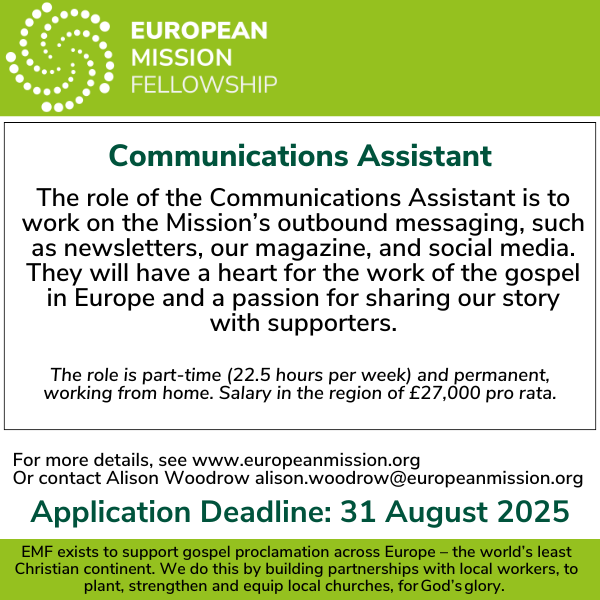The Trinity and the church
Verax Conference, Basel 2009
Many false developments arise in Christian churches due to a deficient understanding of the doctrine of the Trinity. Christians can better overcome personal and spiritual and theological challenges when they possess a comprehensive knowledge of God.
These were pivotal themes in this year’s Verax Conference, which took place on 6-7 March in Basel, Switzerland. The reformed conference attracted some 70 pastors and church workers from Switzerland, Germany, Austria, The Netherlands and the Ukraine.
A unique doctrine
Pastor Andreas Vetterli (‘The Trinity and the normal Christian life’) underlined the uniqueness of the doctrine of the Trinity. The Koran forbids belief in the Trinity while Judaism promotes a featureless monotheism – as do Jehovah’s Witnesses and other Unitarians. Yet to know the triune God is to possess eternal life (John 17:2-3). The Swiss pastor went on to show how our belief in the Trinity affects not only our salvation but also every aspect of everyday life.
Prof. Edgar Andrews (‘The witness of the Trinity to Christ’) gave an in-depth exposition of 1 John 4:6-10. He dealt with the problematic ‘Johannine Comma’ but showed that nevertheless the passage teaches plainly that each person of the Trinity bears his own unique witness to Christ – ‘in whom dwells all the fulness of the Godhead bodily’ (Colossians 2:9-10).
Beginning the Saturday morning session, Dr Wolfgang Nestvogel, pastor and Principal of the Academy for Reformation Theology (Hannover), described the doctrine in detail. The three persons are equal in being but their works are different. The task of the church is to portray God in all his fulness. Failure to understand the unity of the three persons will result in a false idea of God. For example, overemphasising the Holy Spirit can lead to mysticism but neglecting him results in barren pragmatism.
Dr Jürgen-Burghard Klautke (‘The Triune God in the hands of neo-evangelicals’) regretted that the reformed understanding of the Trinity is being lost. While liberal theologians reject the equality of the persons of the Godhead, the trend in Evangelical circles is to reinterpret biblical concepts. While the Reformers spoke of ‘an immutable, omniscient and omnipresent God’, many Evangelicals today reduce him to a consumer-friendly social being who must adapt to human needs. The theology professor gave examples of the way neo-evangelicals reinterpret the doctrine of the Trinity by an eclectic use of Scripture.
The Trinity in preaching and in the church
Robert Strivens, Principal of London Theological Seminary, spoke on ‘The doctrine of the Trinity in preaching’. He emphasised the vital importance of preaching the biblical, Trinitarian God. This did not always mean expounding the doctrine itself but rather preaching with an ever-present sense of the Trinitarian nature of God. Both the unity of the Godhead and the distinction between its persons must be constantly emphasised. The relation between the persons and their distinct roles in the work of salvation need to be made clear. The preacher himself must be filled with a sense of the triune nature of his God, so that he can communicate this effectively to his congregation.
Closing the conference, Dr Martin Erdmann, director of the Verax Institute, spoke on ‘The Trinity; a life-giving truth in the chaos of the church and world today’. His object was to show that it is only on God’s terms that we can solve the perennial problems that have dogged man since his fall into sin. This means that we are in dire need of a biblical theology of God.
The trinity is the heart of Christianity and we hold that God exists as three co-substantial persons, none of whom is derived in his substance from the others. Yet these three distinct persons exist in unity; the diversity and the identity being equally underived. This view of God is the foundation of everything else the Bible teaches, and of the salvation that is the fruit of the gospel of Jesus Christ.
The Verax Institute (www.verax.ws) seeks to spread the reformed faith among German-speaking churches. Its intention is to teach biblical doctrines and to expose the heterodox background of current trends in evangelicalism.
The next conference will take place during 26-27 March 2010 in Basel on the theme of ‘Church worship’. Pray that God’s Word may continue to go forth in clarity and truth to German-speaking peoples.







